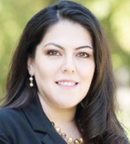Most Latinx people who are LGBTQI+ (lesbian, gay, bisexual, transgender, queer, and intersex) reported being reluctant to share their gender identity and/or sexual orientation with a health-care provider, and a majority have never received cancer information tailored for their community, according to City of Hope–led survey results that were presented recently at a meeting on the Science of Health Care Disparities in Racial/Ethnic Minorities and the Medically Underserved, held by the American Association for Cancer Research (AACR) in association with the AACR Minorities in Cancer Research Council.

Mayra Serrano, MPH, CHES
LGBTQI+ individuals are at higher risk of developing cervical and oral cancers, and Latinx people have a higher risk of developing virus-associated cancers. Yet substantial cancer health disparities exist for both LGBTQI+ individuals and Latinx people, said Mayra Serrano, MPH, CHES, Manager of the Center of Community Alliance for Research and Education at City of Hope, Duarte, California.
Health Disparities Among Double-Minority Population
In conjunction with the Latinx Task Force, a volunteer coalition of individuals in the Greater Los Angeles area working to promote community-wide health and wellness, Ms. Serrano and her colleagues conducted a survey in an effort to understand cancer-related knowledge and behavior within the LGBTQI+ Latinx community.
“Together, this group is a double minority whose increased risk for certain cancers, unfortunately, is not currently being addressed,” said Ms. Serrano. In a statement issued by City of Hope, she added, “We hope that our survey results add to a conversation that needs to be had about how people—regardless of their gender, sexuality, race, or ethnicity—should receive equal and appropriate health treatment and disease prevention education.”
Survey Findings
A total of 176 people completed the survey as of June 2019. Most (74%) identified as Latinx, 82% identified as cisgender, 40% identified as gay, and 28% identified as queer. Some respondents shared their gender identity or sexual orientation with providers (44%), but those who identified as bisexual were less likely to share that information, according to the study findings.
Most respondents (73%) said they were afraid to share their gender identity and/or sexual orientation with health-care providers. People who identified as queer were more likely to be reticent about sharing their sexual orientation.
The investigators reported the following findings from their survey:
- A total of 91% of respondents said they have never received LGBTQI-tailored cancer information
- Of respondents between the ages of 21 and 29 who were eligible for Pap testing, 60% had not been tested in the past 3 years, compared with 22% of all eligible individuals in the United States
- Of those eligible for a mammogram, 50% had not had one in the past 2 years, compared with 29% of all eligible individuals in the United States.
Cultural Incompetency
Examples of a lack of cultural competency occur when, for example, a health-care provider uses inappropriate gender pronouns in conversation or in written materials, or when a physician and support staff assume a patient is cisgender and heterosexual during discussions about sex.
“Results [from the survey] will guide future outreach to and education efforts for the LGBTQI+ Latinx community and their health-care providers,” Ms. Serrano said. “The early data suggest that there is an urgent need to train health-care providers how to make their practice more culturally competent, safe, and welcoming for LGBTQI+ Latinx communities.” ■

